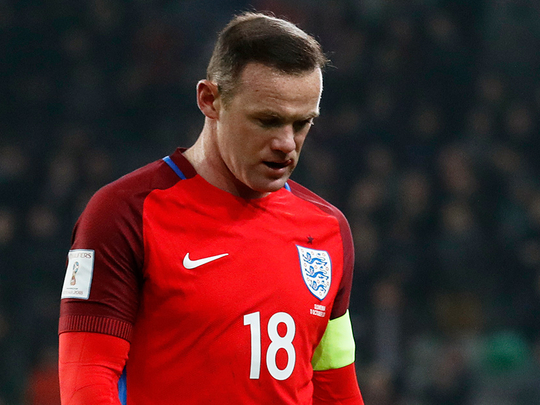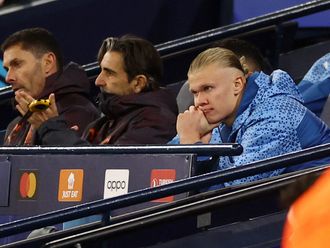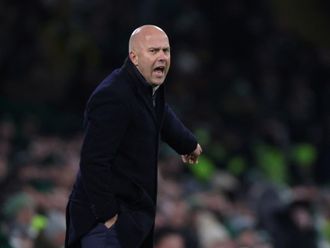
Ljubljana: Life without Wayne Rooney did not even extend into the last quarter of an hour at the Stozice Stadium.
The board went up 18 minutes from time summoning Dele Alli from the fray, the substitute trotting on to receive the armband from Jordan Henderson before he settled into that pocket of space in front of Slovenia’s rearguard. The story was there to be made his own but, in the end, his greatest involvement was as peacemaker in the late melee which summed up a fractious occasion. Even the scriptwriters endured an off-day.
England are two points clear at the top of this group, which may normally be cause for satisfaction, but here was evidence their issues extend far beyond the involvement, or not, of their record scorer.
This was arguably the kind of disjointed display that betrays a side who have gone through three coaches in four matches, leaving a group of players rather unsettled by all the upheaval and bewildered by their own inability to carry out the well-intended instructions of the latest incumbent.
If that scenario had been transposed on to a club team, this mishmash might have been expected, even reluctantly accepted. Here it merely whipped up the frustration. As Gareth Southgate pointed out post-match, he had “inherited a mess”, and sometimes it showed.
The interim manager had placed trust in youth, demanded pace in the pass and movement, and a team willing to make brave decisions in possession. Instead, on a shoddy surface and against canny and rugged opposition, that eagerness gave the whole performance a rather frantic and ragged feel.
They lacked composure too often, and even imagination born of clear thinking. These are not new failings and Rooney’s presence from the start would hardly have guaranteed a more convincing performance given the toils that have dropped him out of the line-up. But it was still troubling to hear the Slovenia coach, Srecko Katanec, justifiably claim disappointment that his team, ranked 67 in the world, had not won. One of their number, Bojan Jokic, even played with a broken toe though his display was never limp.
Southgate will have learnt plenty from the sidelines before he finally felt compelled to turn to a familiar face as he desperately sought to exert some authority on a rather fraught occasion. He ended up flinging on Rooney because “there was a need for some experience in there in that period of the game to calm things down”.
It was all becoming a bit too stretched and rather too frenetic, risking England’s unbeaten record in qualifying that stretches back seven years. He stood by his decision to start with Henderson alongside Eric Dier in central midfield, a pair of athletes accustomed to operating there and ready for a more ambitious approach from Slovenia where Malta had been so meek. This side had required more steel and industry at its core.
The problem was an imbalance remained across the middle, with Alli, Jesse Lingard and Theo Walcott all too peripheral for comfort, and that attacking trio’s failure to make inroads merely spread anxiety elsewhere in the collective. Neither Henderson nor Dier, overworked and increasingly flustered, was exempt.
Both would deliver panicked back-passes that threatened to hand the hosts the lead they merited, only for Joe Hart’s excellence to preserve England their point. The goalkeeper enjoyed one of those inspired matches that may offer Rooney timely hope he, too, can thrive again having been cast to the fringes by his club.
Too many others were off colour. Perhaps this was to be expected. Southgate had only overseen five full training sessions with a squad depleted by withdrawals through injury — Adam Lallana, Nathaniel Clyne, Danny Drinkwater and Raheem Sterling would appear to be the key absentees among plenty, while Harry Kane and Luke Shaw were never in contention — and it would take time for any manager to impress his own ideas on a group.
Time is what he does not have. But the individual errors which crept in revealed the fragility that is never far from undermining the national team’s approach.
Those back-passes summed it up but Gary Cahill and even John Stones, for all his self-confidence on the ball, were culpable of mistakes.
Kyle Walker was not himself on the flank and Daniel Sturridge lurched back into overindulgence. It all felt far too familiar, leaving England’s manager of under two weeks to remind the world of the situation he had inherited.
“I don’t want to be a team that grinds things out,” he said. “We want to pass the ball and we found that difficult at times. What are my expectations of how much the lads can take on in five training sessions? I have to be realistic about the impact we can have.
“But they showed signs of understanding how we want them to play. The mistakes were a concern because you can’t make them at this level but it’s difficult to expect too much because of the inexperience we have.”
Perhaps this was actually a point to be cherished, plucked from a match that was very nearly lost. That would be a realistic approach. It was just hard to discern too many positives given so much was laced with anxiety.










